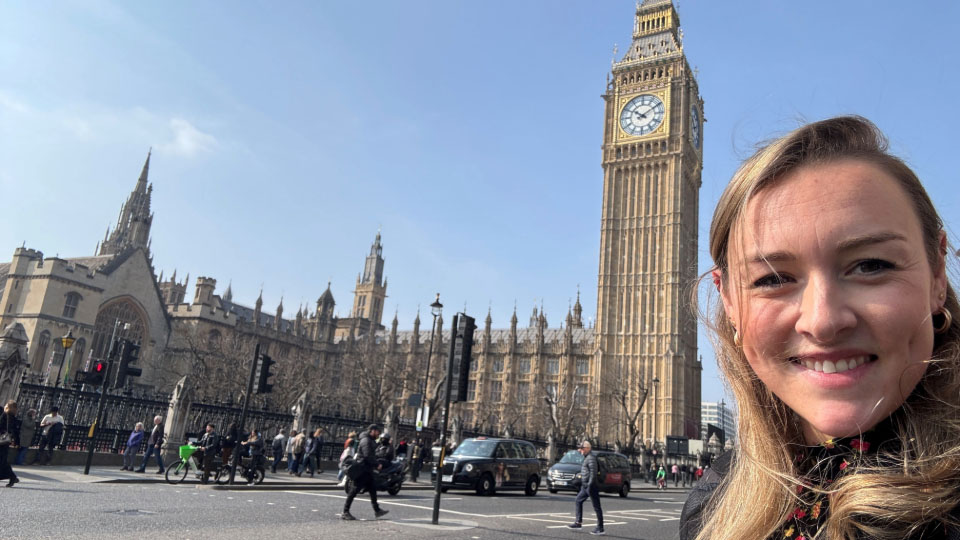My recent experience with the Royal Society’s 2025 Pairing Scheme has left me with a lasting sense of inspiration. It was a week packed with fascinating conversations and experiences, that provided though-provoking insights into how science and policy can work together to benefit society and the environment. I had the privilege of shadowing Baroness Liz Sugg in the House of Lords and spending time with an incredible network of scientists, civil servants, and parliamentarians.
From witnessing oral questions in the House of Lords to insightful discussions with the Lords Library and Peers for the Planet, I gained a unique view into what is going on behind the scenes in policymaking, and where scientific evidence fits within it. Most of all, I came away with a deeper appreciation for the timing, clarity, and relationships needed to make science genuinely useful in this space.
A Shift in Mindset: Inform, Don’t Persuade
One moment that will stay with me was a talk by Baroness Alexandra Freeman, who drew on her experience as both a scientist and policymaker to offer a simple but powerful reminder: our job as scientists is to inform, not persuade. It reframed my understanding of what effective research communication should look like. The Baroness emphasised that we are responsible to the evidence—to present it clearly, without bias, and to trust that good policymaking can follow when the right tools and relationships are in place.
This idea resonated deeply with me, because in academia we are often trained to “sell” our work; to argue, persuade, and defend. But in the policy world, that way of communicating can be unhelpful. Instead, policymakers need to be equipped with timely, relevant, and digestible information. Developing these skills is something I will now actively work on improving, to make my research more accessible and useful.
Two Timelines, One Challenge
One of the strongest themes to come out of the week was the mismatch in timescales between academia and policy. The academic process is often slow and meticulous, but policy often moves at much faster speeds, shaped by political cycles, urgent events, and shifting priorities.
This conflict was echoed in several of the presentations we received throughout the week, including those from POST and the Government Office for Science. While a research paper might take months or years to publish, a policymaker will need a rapid summary in only hours or days to feed into an upcoming debate. The challenge for us as scientists is to bridge that gap, and to be ready with timely, relevant insights when they’re needed, even if our findings aren’t completely final.
That doesn't mean compromising rigour. It means learning to communicate with nuance and confidence, even when the evidence is still emerging.
What I’ll Be Doing Differently
Coming out of the pairing scheme, I’m excited to take what I’ve learned and apply it in practical ways. Here’s what I plan to do next:
- Write policy briefs, press releases, and summaries
I’ll create concise, accessible summaries of my research for policy audiences, highlighting key findings, their relevance, and potential actions. Following advice from Thomas Hornigold, Policy Analyst at the Lords Science and Technology Committee, I’ll use plain, concise language, bullet points, and confidently share my opinions, knowing Parliamentarians value our expertise and evidence-backed insights. While scientific writing often emphasises uncertainties, this isn't always helpful for policy recommendations. Whether writing press releases or preparing evidence for a Select Committee, I strive to prioritise accessibility over academic detail, balancing the need to present evidence fairly and impartially.
- Be more responsive to the policy cycle
I’ll begin monitoring open calls for evidence from POST and parliamentary committee websites through platforms like the Loughborough University Policy Unit and the Parliament Knowledge Exchange Unit. This will enable me to align my communication with timely opportunities to contribute to decision-making. For anyone interested, there’s an excellent summary of engagement opportunities available here: https://www.parliament.uk/get-involved/research-impact-at-the-uk-parliament/ .
- Build relationships, not just outputs
Policy engagement isn’t just about what you produce—it’s about who you know and how well they trust you. One thing I quickly learned during the scheme is that building personal relationships with knowledge facilitators, parliamentarians, or relevant stakeholders greatly increases your chances of successfully engaging in policy, as they will reach out to you when they need your expertise. I will stay connected to the people I met during the week, civil servants and scientists alike, and continue to grow my network of policy professionals.
- Broadening Stakeholder Engagement
I have previously aimed to engage with local stakeholders who are most closely aligned with my work. However, moving forward, I will broaden my focus to include a wider range of national policy stakeholders from the outset—whether that’s MPs, an All-Party Parliamentary Group, a government department, or an NGO. I aim to explore how my research can address broader issues across climate and the environment legislation to maximise the impact of my research.
What This Means Going Forward
This experience has genuinely changed the way I think about impact. Policy engagement and knowledge exchange are not just a final deliverable but more of an ongoing dialogue. As scientists, we need to engage in policy conversations early, listen as much as share, and learn how to communicate in a way that’s timely, trustworthy, and genuinely helpful.
I’m especially grateful to Baroness Liz Sugg for her time, mentorship and enthusiasm, and I’m really looking forward to welcoming her to Loughborough University later this year. I also want to thank the Royal Society for creating such a thoughtful and empowering scheme. I strongly recommend this experience to anyone eligible, regardless of their career stage. Information on the scheme can be found here: https://royalsociety.org/grants/training-mentoring-partnership-schemes/pairing-scheme/
There’s a lot of work ahead, but I’m leaving this experience feeling hopeful and energised. If we, as scientists, continue to build connections with policy—through collaboration, transparency, and respect—we can contribute to shaping evidence-based policies that benefit societies and environments across the UK.
